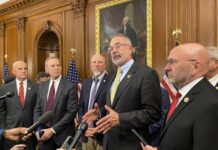
(GA Recorder) — Eleven-year-old Heval Mohamed Kelli thought his family was going on vacation after crossing the Syrian border into Turkey in 1996 as his father paid smugglers to fly them to safety in Germany.
He was unaware at the time of the political persecution his father, an attorney, faced in Syria or of how life would change dramatically as they mostly lived in resettlement camps for the next handful of years in an unfamiliar country.
Kelli eventually settled in Clarkston in 2001, where he and his family still lived in poverty, but opportunities for a better education and job mobility sparked an optimism they didn’t have living in German refugee camps. Two decades later, Kelli watches with keen interest as hundreds of thousands of Afghans flee their country after the Taliban declared control when the U.S. ended its role in the long-running conflict.
Kelli was 17 years old when he arrived in America and couldn’t speak English. He now works at Northside Hospital as a cardiologist. It’s a piece of the American dream that started modestly when he was a teenage refugee working as a dishwasher to support his family. Now he is inspired to help refugees and others living in underserved communities in the U.S.

“These Afghan refugees come from a very unfortunate situation, it’s just so sad to see what’s happening,” he said. “They’re just happy to be somewhere safe for them. But I tell them, this is the only country I think in the world that you could come here. I lived in the Middle East and I don’t think I would have become who I am if I wasn’t here.”
About 123,000 people have been flown out of Afghanistan and 50,000 are now undergoing a security review process at military bases in preparation for a reintegration process in American communities.
Tens of thousands of Afghans who worked directly with the U.S. government began leaving the country a couple of months ago and many arrived after an August evacuation. A majority of those refugees have a special visa status that will allow them to more quickly clear background security hurdles.
The Associated Press reported this week that Biden administration officials have started informing governors and mayors in 46 states about how many from the first wave of 37,000 evacuees to expect in the coming weeks, including more than 1,000 refugees slated to arrive in Georgia.
A coalition of Atlanta nonprofit organizations, including New American Pathways, will likely soon begin helping individuals and their families find housing, jobs, and with other assistance as many of them move to apartments and rental homes in Georgia, predominantly across metro Atlanta.
The largest pool of refugees will go through an even more complicated process because they have not already pursued permanent status as they seek to pass a more rigorous background check.
Finding enough affordable housing for those cleared to resettle in the U.S. will be a major challenge that will also benefit from the kindness of strangers. While resettlement groups typically pay for a few months rent, Airbnb is offering temporary housing across the country for 20,000 Afghan refugees.
The Biden administration has requested $6.4 billion from Congress for the resettlement of Afghan refugees, with goals of 65,000 by the end of September and another 95,000 resettled by September 2022, according to the the AP.
Over 90% of the individuals American Pathways and other local groups serve are paying their own expenses within six months. There’s a strong support system from the faith community and beyond in the greater metropolitan area and among the ethnic groups who rely on each other, said Emily Laney, director of development for New American Pathways.
“Even before the Refugee Act of 1980, groups have been resettling refugees in Georgia,” Laney said. “This is really so intense. There have been a lot of really traumatic events in the last weeks, and we have the resources to support them.
“The people who experienced some of the worst things humanity has to offer, these refugees are strong and resilient and brave,” Laney said.
The amount of resources dedicated to refugee resettlement were slashed under former President Donald Trump’s administration through federal policy changes reducing refugees admitted annually to under 23,000 in 2018 compared to plans in the final year of former President Barack Obama to admit 110,000.
During Trump’s tenure, Muslim-majority nations across the Middle East were among the nations targeted with stronger restrictions hindering a path to a green card.
According to the New American Economy, a nonprofit refugee research organization, Afghans represented under 2% of the overall number of refugees who immigrated to the U.S. between 2002 and 2018.
The Biden administration has raised its refugee admission target to 125,000 people this year. It is an unrealistic benchmark due to diminished resources, but it is a much better direction than the previous four years, according to New American Economy executive director Jeremy Robbins.
“It’s our greatest competitive advantage that people want to come here and work hard, but that obscures the fact that it’s really hard to do if you don’t speak the language, have the network, or can find a job on your own,” he said.
“Having a big influx of people from Afghanistan right now is something where you can expect to have a backlash,” Robbins said. “But one thing that’s different now is that I think the circumstances of how this has happened, seeing people who risked their lives to help us win that war all of a sudden hung out to dry has really occasioned a big shift that seems to be very bipartisan.”
Georgia’s Republican Gov. Brian Kemp last month signaled his willingness to take in vetted Afghan refugees soon after the Taliban took control of their country. That contrasts with the stand fellow Republican and former Gov. Nathan Deal took in 2015 against resettlement of Syrian refugees fleeing a bloody conflict in their homeland.
Witnessing current events has been a crushing experience for Muska Haseeb, an Afghan refugee turned U.S. citizen, as the Taliban regained control following two decades of sacrifice of American troops and treasure and the dashed hopes of Afghans who sought more opportunities in their country.
Haseeb’s family settled in Phoenix in 2012 after spending six years in Pakistan as refugees to escape physical abuse her mother endured in Afghanistan for the offense of working as an administrative assistant.

Today, Haseeb’s mother is a social worker and her 27-year-old daughter runs her own fashion company and will soon start school at the University of Texas in a pre-med program.
“I really wish they can do something about it in the future because definitely nobody wants to stay under the rules of the Taliban,” Haseeb said. “I definitely will want to be a motivation for any new refugees, whether from Afghanistan or any other countries. I want them to see that (the U.S.) is the land of opportunities and we can definitely pursue our dreams and our goals and we can become something here.”
Georgia’s Clarkston set to take on latest Afghan refugees
Clarkston, a DeKalb County city where more than half of the 13,000 residents are foreign-born, is likely to receive an influx of Afghan refugees through New American Pathways and other resettlement agencies in the coming months.
Clarkston has become a starter city for many refugees, earning it the nickname the Ellis Island of the South. It offers affordable rental housing and is small enough for newcomers to walk to schools or its small downtown, as well as offering enough public transportation to get around Atlanta’s two largest counties.
Immigrants frequently take on low-paying jobs at minimum wage and other lower-paid positions as they adjust to life in a new country.
For some refugees who settle in Clarkston, that means daily trips to Gainesville to work in the chicken processing plants.
Still, Clarkston’s leadership was not all that welcoming of foreign nationals and refugees moving into the city as recently as last decade.
In 2013, Clarkston’s former mayor helped enact a ban on resettling new refugees. A couple of years later, when Ted Terry was elected mayor, the moratorium was lifted. He set in motion an accepting attitude within the government that continues to bend the community toward inclusion as more refugees become citizens and vote and run for office.
“I think we finally got to kind of a critical mass of voters that were like, actually we think refugees are a positive thing. And we don’t want to go backwards in Clarkston’s history. We want to look ahead and go forward,” said Terry, who is now a DeKalb County commissioner.
Refugees are known to contribute to their new country’s economy almost as soon as they arrive. Their crime rate in their community is typically low. And they own businesses or attend college at a higher rate than the average American.
Though Kelli lived in a poorer section of Clarkston while he finished school, the city offered an enclave that could have been much worse for a Muslim family new to America not long after 9/11.
“We always say we were more scared than anything,” Kelli said. “I think Clarkston was such a loving community that really provided protection from the harassment that we could’ve faced.
With the withdrawal of U.S. forces from Afghanistan now complete, Catholic Charities Atlanta will continue to help evacuated families find new homes, as it has for the last 20 years.
“Rebuilding your life is not easy,” said Vanessa Russell, CEO of Catholic Charities Atlanta. “These courageous families escaped with just what they could carry. They are brave, resilient, and optimistic about their future. We will welcome these families with a grateful heart and help them integrate and thrive in their new home here in Atlanta.”







